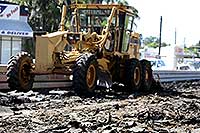Mar 13 2008
Twenty-three percent of the nation's major metropolitan roads -- interstates, freeways and other critical local routes -- have pavements in poor condition, resulting in rough rides and costing the average urban motorist $413 annually in additional vehicle operating costs due to accelerated vehicle deterioration, additional maintenance needs and increased fuel consumption, according to a new report released today by TRIP, a national transportation research group.
 Bad roads, cost motorists money
Bad roads, cost motorists money
TRIP's report, "Keep Both Hands on the Wheel: Metro Areas With the Roughest Rides and Strategies to Make Our Roads Smoother," found that the twenty large urban regions (500,000+ population), with the greatest share of major roads and highways with pavements in poor condition are: Los Angeles, 65%; San Francisco-Oakland, 62%; Honolulu, 62%; San Jose, 60%; San Diego, 53%; New Orleans, 50%; New York City, 49%; Sacramento, 46%; Baltimore, 42%; Oklahoma City, 41%; Tulsa, 40%; Albuquerque, 39%; Omaha, 38%; San Antonio, 37%; Philadelphia, 37%; Riverside-San Bernardino, 35%; Oxnard-Ventura, 35%; Houston, 33%; Fresno, 30%; and Washington, DC, 30%.
"With state and federal transportation funding falling short, the cost of materials and repairs rising and traffic volumes increasing, transportation agencies will face a significant challenge in improving urban pavement conditions," said William M. Wilkins, TRIP's executive director. "The nation needs to develop a new long-term vision for its highway system that would include improving conditions and safety and reducing traffic congestion."
The twenty urban regions with at least 500,000 people where motorists pay the most annually in additional vehicle maintenance because of roads in poor condition are: Los Angeles, $778; San Francisco-Oakland, $761; Honolulu, $760; San Jose, $746; San Diego, $684; Tulsa, $682; Oklahoma City, $661; Sacramento, $655; New Orleans, $636; New York, $623; Albuquerque, $604; Riverside-San Bernardino, $586; Baltimore, $586; Omaha; $584; Oxnard-Ventura, $571; Philadelphia, $548; San Antonio, $539; Houston, $523; Fresno, $515; and Dallas-Fort Worth, $500. Driving on roads in disrepair increases consumer costs by accelerating vehicle deterioration, increasing the frequency of needed maintenance and increasing fuel consumption and tire wear.
According to the TRIP report, continued increase in urban traffic is putting significant wear and tear on the nation's urban roads. Overall travel on urban roads increased by 39 percent from 1990 to 2005; urban travel by large commercial trucks grew at an even faster rate, increasing by 49 percent from 1990 to 2005. Large trucks place significant stress on road surfaces. Overall vehicle travel is expected to increase by approximately 30 percent by 2020 and the level of heavy truck travel nationally is projected to increase by approximately 39 percent by 2020.
Although the share of major urban roads in poor condition has decreased since 2002, conditions are likely to worsen in the future under current transportation funding projections. A U.S. Department of Transportation (DOT) report to Congress indicates that through 2025 the nation will fall short of the cost of maintaining current urban pavement conditions by $119 billion and will fall short of making significant repairs by $270 billion.
Maintaining urban roadways in their current condition would require a 56 percent increase in annual funding, while significantly improving the physical condition of urban roadways would require a 126 percent increase in annual funding.